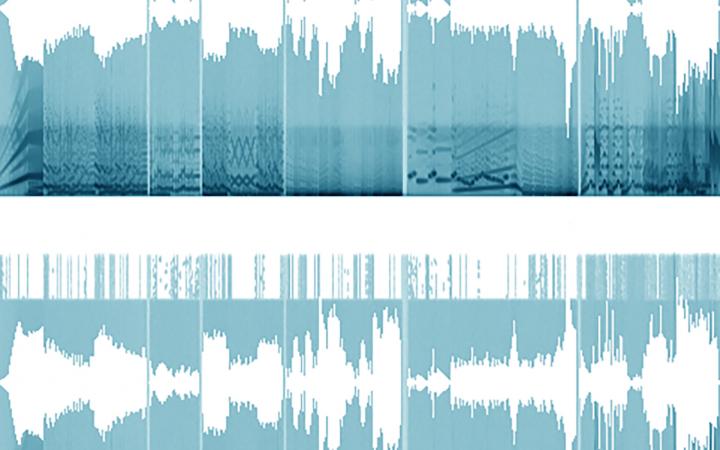IDEAMA
International Digital Electroacoustic Music Archive

- Duration
- 1988
The International Digital Electroacoustic Music Archive IDEAMA was initiated in 1988 by Max Mathews, Johannes Goebel and Patte Wood, who were all members of the Center for Computer Research in Music and Acoustics (CCRMA) at Stanford University, USA at that time. In 1990 IDEAMA was founded in cooperation between the newly established ZKM in Karlsruhe and the CCRMA. Its mission was to preserve the world's most important early works of electroacoustic music from decay, to collect them, to make them accessible to the public by transferring them to a digital medium.
The bodies active at IDEAMA were: the Executive Committee, which included representatives of the two founding institutions; the Advisory Board, which included representatives of the partner institutions in an advisory capacity; the International Board[1], whose members supported the international reputation and policy of the archive; and the two Regional Selection Committees.
The ZKM committee[2] was responsible for European music, the CCRMA committee for the Americas and Asia. The first official meeting of all members of the European selection committee was the Karlsruhe IDEAMA Symposium in 1992, at which the binding listing of the European contribution to the common basic collection of IDEAMA and a catalogue of criteria for the classification of electroacoustic music was discussed and decided upon.
All the works selected by the selection committees, from the beginnings in 1929 to the year 1970, were combined to create the official IDEAMA title list, which contains 708 works, of which, however, 138 could no longer be found. The collection included previously unknown, newly developed music as well as commercially available works collected for the period in which they were no longer on the market.
The IDEAMA basic collection consists of over 100 hours of music, which are now stored on hard disk. Institutions wishing to participate in this collection for teaching and research purposes can become members of the IDEAMA project as IDEAMA affiliate institutions on the basis of a Memorandum of Understanding. The costs for this replace the IDEAMA/ZKM Karlsruhe pro rata the hardware and its configuration, the duplication and the production of the database.
The database contains information about the year and the studio of the composition as well as biographies of the composers and work descriptions in three languages (German, English and French).
Structurally, IDEAMA consists of the two founding institutions ZKM and CCRMA and partner institutions, which collect and produce materials themselves, as well as the affiliate institutions. In 1996 CCRMA withdrew from the project for financial reasons, so that since then IDEAMA has had its headquarters at ZKM.
Most of the following partner institutions make the collection publicly available:
- Institut de Recherche et de Coordination Acoustique/Musique (IRCAM) Paris [F]
- Institut International de Musique Electroacoustique de Bourges (IMEB) [F]
- Institut Nationale de l´Audiovisuel / Groupe de Recherches Musicales (INA/GRM) Paris [F]
- Instituut voor Psychoacustika en Elektronische Muziek (IPEM) Gent [B]
- Instituut voor Sonologie Koninklijk Conservatorium Den Haag [NL]
- National Institute of Informatics (NII) Tokyo [J], formerly: National Center for Science Information Systems (NACSIS)
- New York Public Library (NYPL) [USA]
- Polskie Radio, Contemporary Music Department, Warsaw [PL]
- Stiftelsen Elektro-Akustisk Musik i Sverige (EMS) Stockholm [S]
All of the following affiliate institutions - in addition to the founding institutions - make the collection publicly accessible:
- Aalborg Universitet Institut for Musik og Musikterapi [DK]
- Art Center Nabi, Seoul [ROK]
- Bibliothek der Musik-Akademie der Stadt Basel [CH]
- Brandeis University Library, Waltham, MA [USA]
- Centre For Computational Musicology and Computer Music of University of Limerick [IRL]
- Danish Institute for Electroacoustic Music (DIEM), Aarhus [DK]
- Institut für Computermusik und elektronische Medien (ICEM) of the Folkwang-Hochschule Essen [D]
- Institut für Elektronische Musik und Akustik (IEM) of the Kunstuniversität Graz [A]
- Institut für Musikwissenschaft und Musikinformatik (IMWI) of the Hochschule für Musik Karlsruhe [D]
- Institute for Computer Music and Sound Technology (ICST) / Medien- und Informationszentrum MIZ der Zürcher Hochschule der Künste [CH]
- Kungliga Musikhögskolan, Stockholm [S]
- Library of Congress, Recorded Sound Collection, Washington, DC [USA]
- Michigan State Universtiy, College of Music, East Lansing, MI [USA]
- NoTAM - Norsk nettverk for Teknologi, Akustikk og Musikk, University of Oslo [N]
- Stiftung Haus der Klänge, Mädris-Vermol [CH] [ [Foundation dissolved end of 1999]
Contact
For further information please contact Hartmut Jörg (Audio Collection).
Further Information
Max V. Mathews and Marcia L. Bauman
Historical Aspects of Computer Music (Past)
[1] Members of the International Board:
Francois Bayle, Luciano Berio, Lars Gunnar Bodin, Pierre Boulez, John Cage, John Chowning, Hugh Davies, Julio Estrada, Hiroshi Inose, Mauricio Kagel, Francisco Kroepfl, György Ligeti, Max V. Mathews, John Pierce, Steve Reich, Jean-Claude Risset, Pierre Schaeffer, Toru Takemitsu, James Tenney and Iannis Xenakis.
[2] The European selection panel was composed of:
Francois Bayle (FR), Nicola Bernardini (Italien), Lars Gunnar Bodin (SWE), Christian Clozier (FR), Hugh Davies (UK), Rudolf Frisius (D), Johannes Fritsch (D), Gottfried Michael Koenig (NL), Josef Patkowski (PL), Josef Anton Riedl (D), Herman Sabbe (BEL) and Jürg Stenzl (CH).
- Organization / Institution
- Center for Computer Research in Music and Acoustics (CCRMA), Stanford University; ZKM | Karlsruhe
- Initiatoren